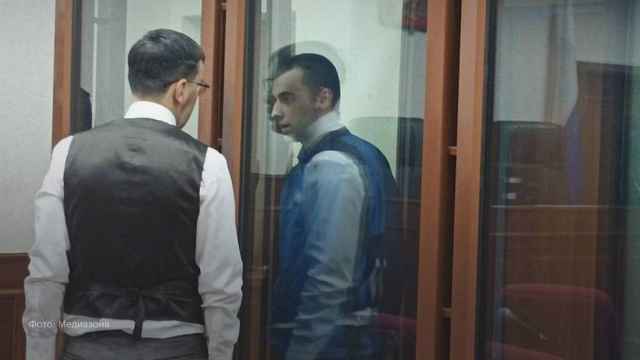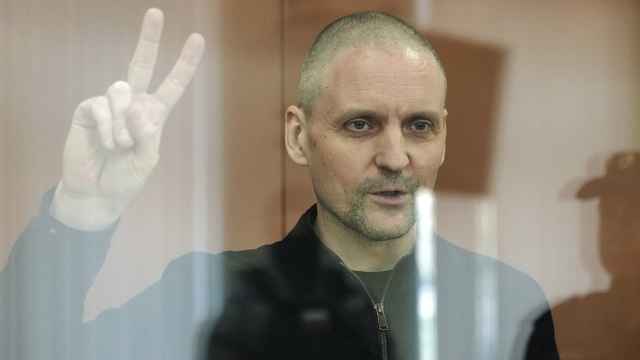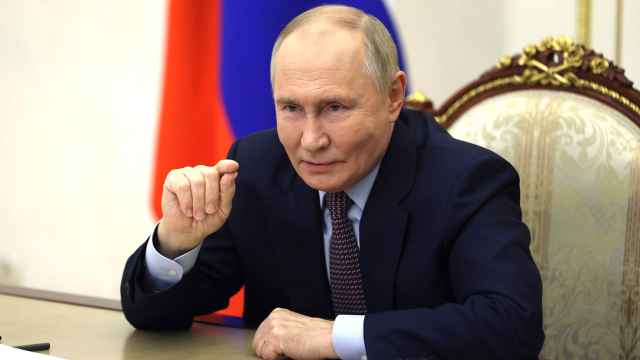Yulia endured three years of almost daily rapes and beatings before she fled her husband with her four children, living for the next year in constant fear that he would find them.
"I couldn't live in my flat, even though I owned it," the Moscow hairdresser said, too scared to give her full name.
"For a year I rented, but then we ran out of money," she said in an interview at Moscow's only public shelter for battered women, Nadezhda ("Hope").
Fundamentally conservative and guided by the doctrines of a resurgent Orthodox Church, Russia has no legal protections for women like Yulia, believing that family disputes — even violent ones — should be resolved in the home, behind closed doors.
A new draft law would change that by making it clear that domestic violence is illegal and laying out the rights of victims in Russian law for the first time. Powerful sponsors include parliamentary deputies from United Russia, the party loyal to President Vladimir Putin that dominates the parliament.
But with Putin aiming to shore up support from conservative voters and the church — his political power base — in the face of popular protests, the bill's fate is uncertain.
"This is a cultural problem, a centuries-old mentality in which the man is the head of the family and others obey him or get punished," said Natalia Pazdnikova, a co-author of the draft law and director of Nadezhda. "Russian women are very patient and enduring, ready to suffer for their children and families."
The draft law would introduce the power to issue restraining orders, a common procedure in the West, and give law enforcement officials more training in dealing with abuse. It would also allow police to compel offenders to undergo counseling, require them to report to police up to four times a month, and provide victims with temporary accommodation.
Women's rights activists say that currently, police, prosecutors and judges in Russia too often advise women seeking help to go home and make peace with their husbands, opening the women up to more physical violence as well as threats and emotional blackmail to drop their complaints.
Two similar draft laws were watered down and then dropped after the Soviet Union collapsed in 1991. Supporters are determined that will not happen this time and hopeful that the law could pass as soon as the end of the year.
Initial signs are not encouraging, however: Committees in the lower house have been looking at the draft, but there is no date fixed or even estimated for a plenary gathering to start moving forward.
NO DATA
The scale of domestic violence in Russia is not known because of the lack of official data, another problem the draft law hopes to address.
The World Health Organization estimates a third of the world's women who have been in a relationship experience physical and/or sexual violence by an intimate partner.
Marina Pisklakova-Parker, a recognized expert on the subject as head of ANNA, which pioneered campaigns against domestic violence in Russia in the 1990s, says she believes the figure for Russia is close to that.
Various estimates have put the number of Russian women killed by their husband, partner or a close relative at between 10,000 and 14,000 every year. That would amount to up to a fourth of all murders and violent crimes in Russia, but this figure could not be confirmed, nor was it possible to get more specific data from the Russian police or federal statistics office despite repeated requests.
Police statistics do show that some 40 percent of all violent crimes in Russia are committed within families. Yet only 3 percent of domestic violence cases in Russia end in a court sentence, women's rights activists say, basing their estimate on anecdotal experience.
Since domestic violence is not cited in criminal statutes, the onus is on victims to provide evidence for prosecution under statutes covering other crimes, such as assault and battery.
"But domestic violence has its own specifics that go beyond these crimes. It's a particular type of violence since the victim goes on living with her assailant under one roof," said Irina Sokolova, a United Russia lawmaker sponsoring the draft.
"That leads to an intensifying spiral of crime with tens, hundreds of thousands of women falling victim to domestic violence year by year," she said.
FAMILY MATTERS
Putin has not made clear where he stands on the issue. He has been widely condemned abroad for introducing more conservative policies on social issues since his return to the Kremlin in 2012, including a law banning gay "propaganda." Criticism at home is more muted.
At a meeting with his core support group, the People's Front, in March, he called for more protection of children at home but made no mention of violence against women.
His spokesman, Dmitry Peskov, said the Kremlin was not familiar with the draft law and did not know how it would differentiate between violence at home and elsewhere.
ANNA's deputy head, Andrei Sinelnikov, said women's rights have moved down the political agenda since Putin first rose to power in 2000 and focused more on issues such as living standards and economic growth.
"Even if senior state officials talk women's rights, they talk kindergartens and other matters that relate only to a very traditional woman's social role," he said.
The support of the church, which Putin has portrayed as the guardian of national values, is far from certain. Some three quarters of Russians consider themselves Russian Orthodox.
"The problem indeed exists. Women come to priests very often to complain about domestic violence," said Vsevolod Chaplin, head of the church's department for ties with society.
"Some support the law, but there are critical voices too that it diverts attention from problems such as alcoholism, narcotics, aggressive mass culture or financial problems," Chaplin said.
A leading parents' group, ARKS, plans to campaign against it.
"This is just dangerous," said ARKS head Olga Letkova. "It may destroy families altogether."
Chaplin worried the bill would give law enforcement officials excessive powers to interfere in domestic matters.
"It's best to try to safeguard the family and solve the problem at the same time," he said.
"Sometimes there is no other way than to flee, but … it's better to try to help these people who are already bound together and would suffer even more if they are separated."
HOPE
Yulia was lucky to find protection at Nadezhda, which has just 30 beds for a city of nearly 12 million.
"I don't think I would have made it on my own," she said.
The pastel-colored, two-story building welcomes visitors with a fountain whose gently falling water is meant to soothe nerves. The shelter's psychologists run therapy classes to help the women overcome their fear.
"I was under so much stress, terrified — it's hard to express," said Amina, 57, who spent four years moving from one home to another with her five-year-old grandson, Islam, who has not spoken since his mother was killed in a family conflict.
Amina, too, finally found refuge at Nadezhda.
"Being able to live here is a great relief," she said.
The shelter welcomed nearly 500 women last year, Pazdnikova said.
"Our practice shows that such a law is really needed. It would finally send a clear signal to everybody that domestic violence is not allowed and that there is a clearly defined punishment for it," she said.
A Message from The Moscow Times:
Dear readers,
We are facing unprecedented challenges. Russia's Prosecutor General's Office has designated The Moscow Times as an "undesirable" organization, criminalizing our work and putting our staff at risk of prosecution. This follows our earlier unjust labeling as a "foreign agent."
These actions are direct attempts to silence independent journalism in Russia. The authorities claim our work "discredits the decisions of the Russian leadership." We see things differently: we strive to provide accurate, unbiased reporting on Russia.
We, the journalists of The Moscow Times, refuse to be silenced. But to continue our work, we need your help.
Your support, no matter how small, makes a world of difference. If you can, please support us monthly starting from just $2. It's quick to set up, and every contribution makes a significant impact.
By supporting The Moscow Times, you're defending open, independent journalism in the face of repression. Thank you for standing with us.
Remind me later.






